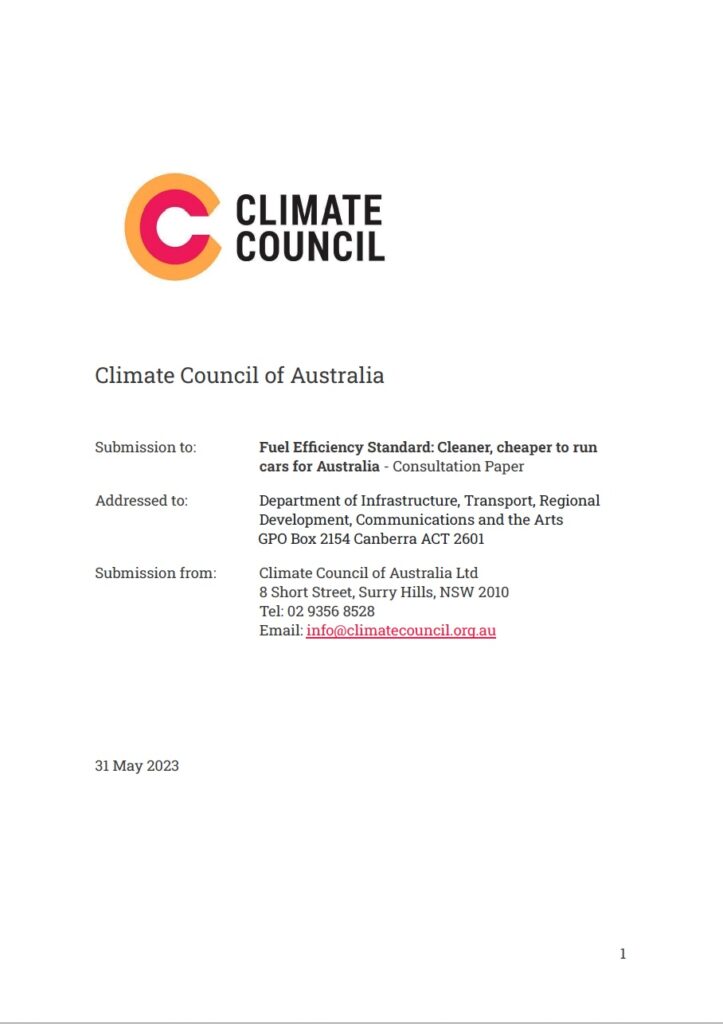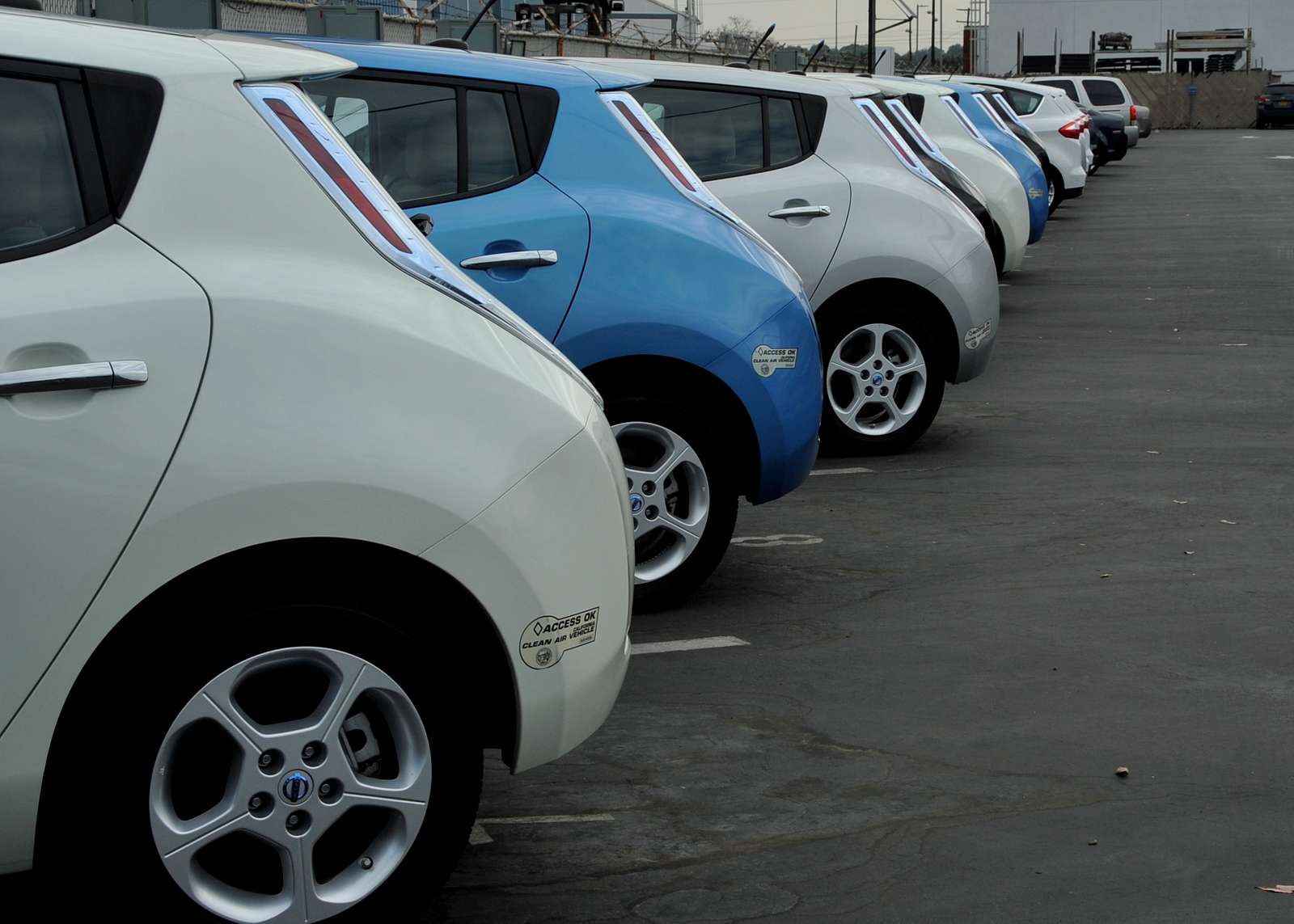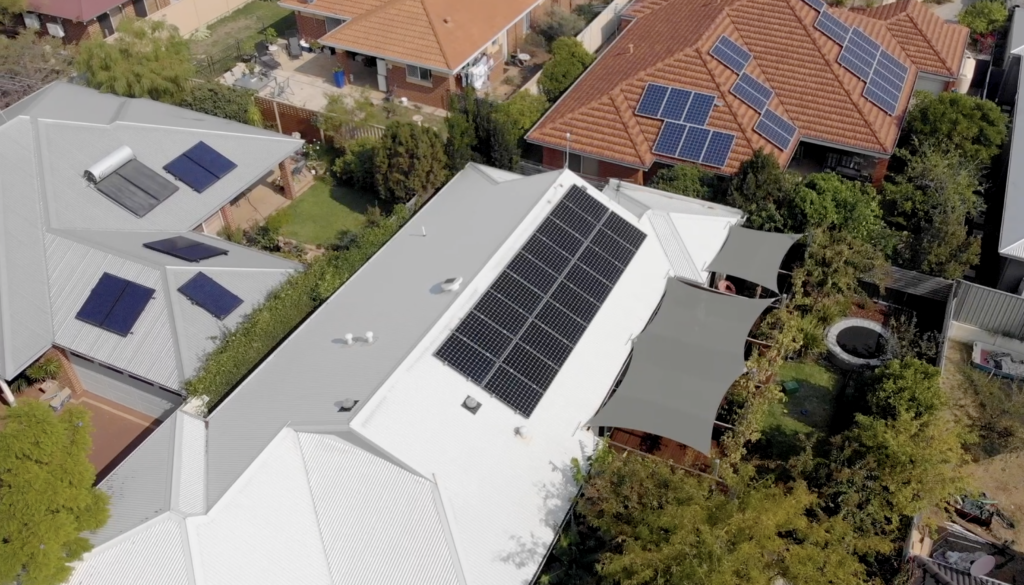The Climate Council welcomes the opportunity to contribute to the Australian Government’s consultation on the design of a fuel efficiency standard for Australia’s light vehicle fleet. This is an important – and long overdue – initiative to improve the efficiency of Australia’s cars, utes and vans to cut costs for drivers and reduce harmful carbon pollution from the fleet. We urge the Government to move swiftly in designing and delivering this reform, so that Australians can share in the benefits already being enjoyed by millions of drivers around the world.
Tackling transport emissions is essential to reach net zero.
Transport accounts for 19 percent of Australia’s greenhouse gas emissions, and is the third largest source of emissions behind electricity and stationary energy (DCCEEW, 2022a). Road transport is responsible for the bulk of transport emissions, with cars and light commercial vehicles alone making up 62 percent of this pollution (DCCEEW, 2022b). Importantly, at a time when emissions from other sectors have started a welcome and necessary decline, personal transport is one of Australia’s fastest growing sources of emissions (DCCEEW, 2022b).
The Climate Council’s recommendations are summarised below:
Recommendation 1
The Climate Council recommends the proposed guiding principles be made more explicit regarding the concrete outcomes that will be pursued through the policy design process, and particularly set out overarching goals of: a trajectory consistent with seeing 100 percent of new vehicles sold be zero emissions as soon as possible and by 2035 at the latest; aligning with comparable markets on the headline target for grams of CO2 per kilometre emitted; minimising the use of credits and other flexibility mechanisms which can undermine the effectiveness and transparency of the standard.
Recommendation 2
The Climate Council recommends the majority of the chosen fuel efficiency standard settings be placed in primary legislation for transparency, and to embed ongoing certainty.
Recommendation 3
The Climate Council recommends the Australian Government address the full suite of technology, policy and behaviour change considerations underpinning the decarbonisation of transport in Australia, and deal with emissions from transport modes beyond light vehicles, as part of the development of a comprehensive National Transport Decarbonisation Plan.
Recommendation 4
The Climate Council recommends the annual emissions ceiling be set on a trajectory consistent with achieving 100 percent of new vehicles sold being zero emissions by 2035 from commencement of Australia’s fuel efficiency standard and remain on that trajectory throughout its implementation.
Recommendation 5
The Climate Council recommends the average annual emissions ceiling be set to align with other comparable markets on the headline target, not simply the annual average rate of decline.
Recommendation 6
The Climate Council recommends the adoption of either a ‘start strong’ approach or a ‘linear’ approach for all vehicle categories if a twin trajectory design is intended. We caution against adopting a ‘mixed start’ approach which sets different trajectories for different vehicle classes.
In setting a starting point for the average annual emissions ceiling, the Climate Council calls attention to the current range of lower emission/higher efficiency vehicles available in the Australian market. The starting point for an Australian standard should reflect the best available current performance for internal combustion vehicles – not the overall average performance for all vehicles.
Recommendation 7
The Climate Council recommends the average annual emissions ceiling be reviewed after the first three full years of implementation, and at equivalent intervals after that.
Recommendation 8
The Climate Council recommends the legislation establishing a fuel efficiency standard explicitly state that any future adjustments to the average annual emissions ceiling may increase the rate of transition, but may not reduce it.
Recommendation 9
The Climate Council recommends the decision on whether to adopt a single or twin trajectory design for Australia’s fuel efficiency standard be guided by the goal of achieving the maximum possible emissions reduction in the years to 2035.
If a twin trajectory approach is initially adopted, the Climate Council notes it will be essential for all vehicle classes to achieve 0 g CO2/km by 2035 at the latest, regardless of the initial slope of the transition trajectory for each.
Recommendation 10
The Climate Council recommends the Australian Government end tax policies which currently incentivise the purchase of larger, heavier and higher-emitting vehicles such as the Fringe Benefits Tax exemption and the Instant Asset Write-Off approach, in parallel with designing and implementing a strong fuel efficiency standard.
Recommendation 11
The Climate Council recommends that any banking, transferring and pooling of credits be implemented subject to the requirement that existing credits may only be banked, transferred, pooled or otherwise carried forward within each legislated review period.
Recommendation 12
The Climate Council recommends the use of ‘super credits’ be avoided to the greatest extent possible in designing an Australian fuel efficiency standard. If super credits are to be provided anywhere within the policy design, they should be limited to vehicle types and technologies which are still genuinely at a nascent stage of development.
Super credits should not be made available for entire classes of vehicle technology (e.g. battery electric vehicles) or model types where there are suitable alternatives readily available (e.g. heavier passenger SUVs not suited to offroad and work uses).
Recommendation 13
The Climate Council recommends manufacturers should ideally not be eligible for off-cycle credits of any kind. If off-cycle credits are to be included in some form, their use should be capped at a low, per vehicle level. Any technologies supplied as standard in other markets at the time of commencement for Australia’s fuel efficiency standard should not be eligible for off-cycle credits.
Recommendation 14
The Climate Council recommends the use of high global warming refrigerants be banned outright in Australia if they are of sufficient concern to warrant policy intervention. Manufacturers should not be able to earn credits by avoiding their use.
Recommendation 15
The Climate Council recommends the total benefit a vehicle manufacturer can receive through use of credits – super credits, off-cycle credits and any others – should be capped at a low level to ensure integrity of the policy framework
Recommendation 16
The Climate Council recommends the enabling legislation for a fuel efficiency standard be introduced to Parliament before the end of 2023, with passage during early 2024. This would allow the policy to commence on 1 July 2024.
Following commencement on 1 July 2024, the average annual emissions ceiling settings could then be determined on a financial year basis. This aligns with both the business year for financial and corporate reporting purposes, and other major emissions reporting frameworks.
Recommendation 17
The Climate Council recommends penalties be set at a sufficient level to drive genuine compliance. It is consistent with regulatory practice across government that stronger penalties will better incentivise compliance and therefore support increased supply of lower and zero emission vehicles.
Recommendation 18
The Climate Council encourages the Department to also consider implementing ‘anti-avoidance’ rules and associated penalties as part of the design of an Australian fuel efficiency standard, to further incentivise genuine compliance and a level playing field for all participants.
Recommendation 19
The Climate Council recommends the information disclosure requirements underpinning an Australian fuel efficiency standard be designed with effective implementation of the framework and achievement of positive outcomes for the community in mind – not minimising regulatory requirements for manufacturers.
Recommendation 20
The Climate Council recommends manufacturers be required to report in detail on their use of credits in each compliance period. This reporting should be made in a standard format determined by regulators, and cover the use of any credits available, broken down by volume and category.
Recommendation 21
The Climate Council recommends the regulator for an Australian fuel efficiency standard be tasked with aggregating and making available free, public, frequent, granular and reliable data about vehicle sales on an annual basis.











